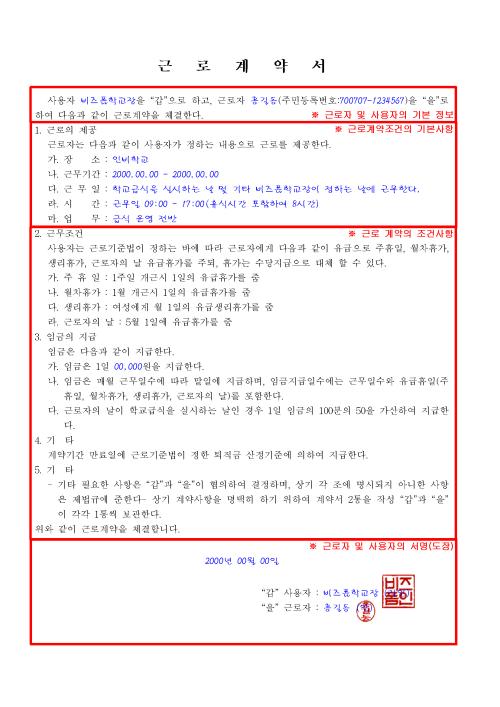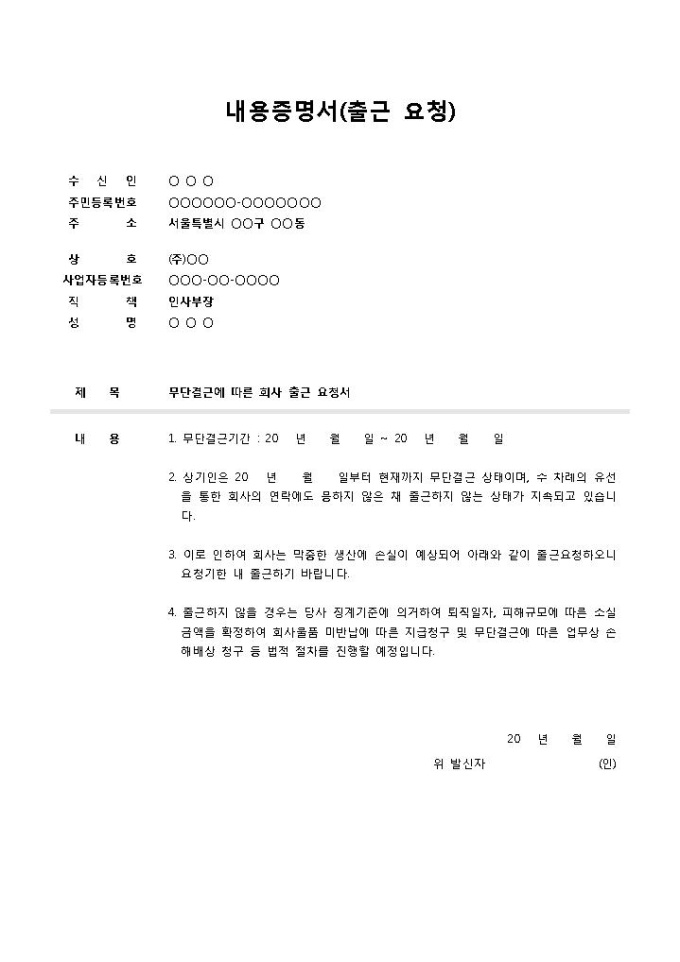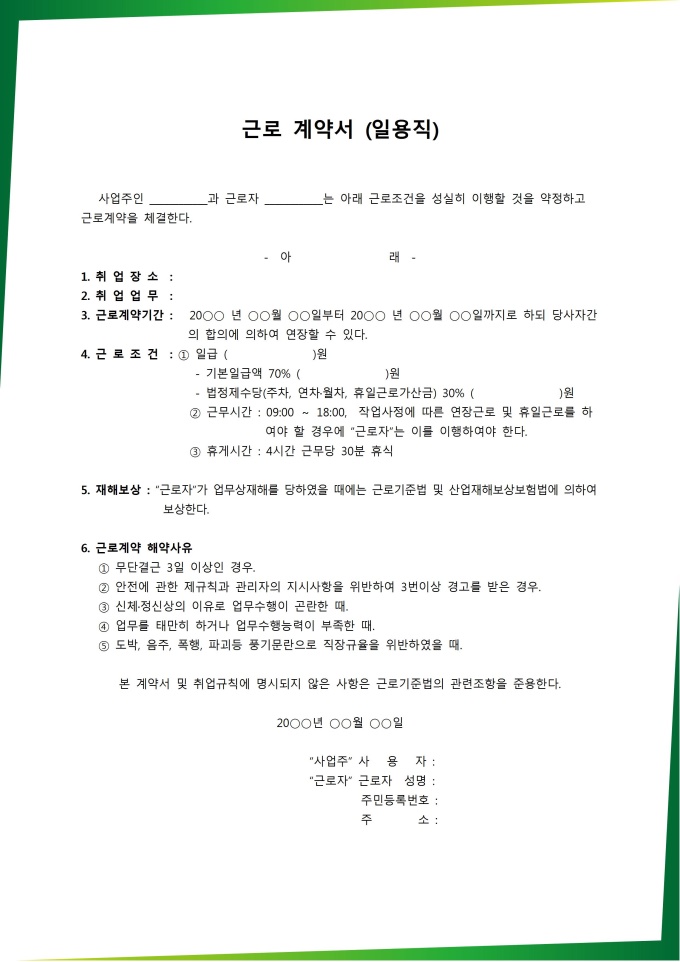근로계약서 작성 후 무단퇴사
사용자가 검색한 키워드: 근로계약서 작성 후 무단퇴사 근로계약서 쓰고 추노, 근로계약서 작성 후 퇴사, 근로계약서 쓰고 일주일 퇴사, 무단퇴사 잠수, 근로계약서 쓰고 퇴사, 근로계약서 쓰고 안가면, 근로계약서 기간 내 퇴사, 근로계약서 퇴사 30일
Categories: Top 17 근로계약서 작성 후 무단퇴사
무단퇴사와 손해배상청구에 대하여
여기에서 자세히 보기: b1.brokengroundgame.com
근로계약서 쓰고 추노
근로계약서 or employment contracts are a crucial aspect of any employment relationship. In Korea, these contracts serve as a legal binding agreement between employers and employees, outlining the terms and conditions of the employment. The contract specifies the duties, responsibilities and rights of the employer and employee, and is aimed at protecting both parties’ interests.
추노 or severance pay is a lump-sum payment made to an employee upon the termination of their employment. This payment serves as compensation for the employee’s years of service and is commonly offered in South Korea. In this article, we will look at the role of the Korean employment contract and the importance of severance pay.
Why is an Employment Contract Important in Korea?
An employment contract is a legal agreement between an employer and employee, stipulating the terms and conditions of the employment. The Korean labor laws require employers to provide written employment contracts to all new employees within the first month of employment. The contract must cover the following:
– The job title and job description
– The period of employment
– The compensation package, including salary, bonuses, and any other benefits
– The start and end time of the workday, weekly working hours, and any overtime policies
– The vacation and sick day policies
– Any grievance procedures or disciplinary actions
A proper employment contract provides both parties with a clear understanding of the terms and conditions agreed upon. It sets expectations for both the employer and employee, reducing the likelihood of misunderstandings and disputes.
Employers who create contracts that comply with the labor laws demonstrate their commitment to providing fair and equal treatment to their employees. It also ensures that both parties are aware of their legal rights and responsibilities.
What is Severance Pay and Why is it Important in Korea?
Severance pay is a payment made to employees upon the termination of their employment. It serves as compensation for the employee’s years of service and is a common practice in Korea. The payment amount is calculated based on the employee’s years of service, with employers obligated to pay a minimum of one month’s salary for every year of service.
Severance pay is a crucial aspect of the employment package and serves as a form of job security for employees. It ensures that employees are compensated for their service and incentivizes employers to retain their staff. In some cases, it may be the only form of financial security that a departing employee receives, making it a vital aspect of their employment.
What Happens If an Employer Fails to Provide a Contract?
Employers in Korea who fail to provide a written employment contract within the first month of employment are in violation of the labor laws. If an employer fails to provide a contract, they risk legal disputes, financial penalties, and negative consequences to their reputation.
Employers may also face challenges in the event of an employee dispute or issue. Without a written agreement, it may be challenging to determine the terms and conditions of the employment, making it difficult to resolve disputes.
What Happens If an Employer Fails to Provide Severance Pay?
Employers in Korea who fail to provide severance pay to employees upon termination may face legal action. The labor laws stipulate that employers must provide a severance payment of at least one month’s salary for every year of an employee’s service. Failure to do so may result in legal disputes, financial penalties and negative consequences to the employer’s reputation.
In serious cases, employers who violate labor laws may face criminal charges. Employees who are terminated without proper compensation are entitled to file complaints with the labor authorities or pursue legal action through the courts.
What Can Employers Do to Avoid Disputes?
Employers in Korea can take several steps to avoid disputes related to employment contracts and severance pay. These steps include:
– Creating a clear and detailed employment contract that complies with the labor laws
– Ensuring that employees receive a copy of the contract and are aware of its contents
– Communicating clearly with employees regarding their rights and responsibilities, as well as any policies or procedures related to termination and severance pay
– Keeping accurate records of employee service and compensation, including any severance payments made
– Responding promptly and fairly to employee disputes or concerns
By following these steps, employers can reduce the risk of disputes and minimize the challenges associated with employee termination.
FAQs:
Q: Are all employees eligible for severance pay in Korea?
A: Generally, employees who have worked for more than one year are eligible for severance pay. However, certain categories of employees, such as temporary or contract workers, may not be eligible.
Q: What happens if an employee resigns before completing one year of service?
A: Employees who resign before completing one year of service are not eligible for severance pay.
Q: Can an employer negotiate the amount of severance pay with an employee?
A: The amount of severance pay that an employer is obligated to provide is determined by law, and as such, cannot usually be negotiated.
Q: How is severance pay calculated?
A: Severance pay is typically calculated based on the employee’s years of service, with employers obligated to pay a minimum of one month’s salary for every year of service.
Conclusion:
Employment contracts and severance pay are vital aspects of the employment relationship in Korea. Employers who create clear, detailed contracts that comply with the labor laws demonstrate their commitment to treating their employees fairly and equally. Providing proper severance pay provides financial security for employees and incentivizes employers to retain their valuable staff. Employers who take steps to avoid disputes related to these areas can enjoy a stronger relationship with their employees and minimize the legal and financial risks associated with disputes.
근로계약서 작성 후 퇴사
근로계약서는 근로자와 사업자 간의 근로계약을 작성할 때 필수적인 문서입니다. 근로계약서 작성 후, 근로자가 언제든지 퇴사할 수 있는데, 이 경우 근로자에게 몇 가지 권리와 의무가 있습니다. 근로계약서 작성 후 퇴사에 대한 이해는 근로자와 사업자 양측에게 유용합니다.
근로계약서 작성 후 퇴사 권리
근로자는 언제든지 근로계약서에 따라 퇴사할 수 있습니다. 이 경우, 근로자는 사업자에게 사전 통보를 해야 하며, 최소한의 사전 통보 기간은 근로계약서에 명시되어 있습니다. 만약 사전 통보 기간을 어기면 벌금을 부과할 수 있으며, 이는 근로계약서에 따라 달라질 수 있습니다.
또한 근로자는 퇴사 전에 필요한 모든 서류를 처리하고, 업무 수행에 필요한 자산 등을 반환해야 합니다. 만약 근로자가 퇴사 전에 이러한 의무를 다하지 않으면, 법적으로 책임을 지게 됩니다.
사업자는 근로자가 퇴사할 때 권리와 의무를 가지며, 이에 대해 근로계약서에 명시되어 있습니다. 예를 들어, 사업자는 근로자의 출근 시간을 기록하고, 근로자가 수행한 업무와 분야를 확인할 수 있는 문서를 작성할 수 있습니다. 이런 경우, 근로자는 반드시 해당 문서를 확인하여, 문제가 있을 경우 사업자와 협력해야 합니다.
근로계약서 작성 후 퇴사 의무
근로자가 퇴사할 때, 근로계약서에 따라 다양한 의무가 있습니다. 이러한 의무들은 근로자가 퇴사하기 전에 작성한 업무 계약서와 연결되어 있습니다.
예를 들어, 근로계약서에는 근로자가 어떤 종류의 업무를 수행해야 하는지, 출근 시간, 수당, 보험 등 세부 항목이 명시되어 있어야 합니다. 만약 근로자가 이러한 의무를 다하지 않으면, 사업자에 대한 불만이 발생할 수 있으며, 이는 법적으로 문제가 될 수 있습니다.
또한 근로자는 퇴사 전에 상사나 동료들에게 신뢰를 높이고, 적극적으로 업무를 수행해야 합니다. 이러한 노력이 있으면, 사업자는 근로자를 더욱 가치있는 인재로 평가하게 됩니다.
근로계약서 작성 후 퇴사 방법
근로자가 근로계약서 작성 후 퇴사하려는 경우, 몇 가지 방법이 있습니다. 일반적으로 근로자는 사업자에게 퇴사 피드백을 제공하고, 퇴사 통보서를 작성하여 서면으로 제출합니다.
이 서식은 근로자가 퇴사할 예정인 날짜와 해당 이유, 사업자에게 제공할 정보, 업무 반환에 대한 계획 등을 명시해두면 됩니다. 이 서식은 근로자가 퇴사를 계획하는데 도움이 되며, 사업자가 근로자의 퇴사에 대해 미리 대비할 수 있습니다.
FAQs
Q1. 근로계약서 작성 후, 근로자는 언제든지 퇴사할 수 있나요?
A1. 네, 근로자는 근로계약서 작성 후, 언제든지 퇴사할 수 있습니다. 다만, 사전 통보 기간을 지켜야 하며, 서면으로 명시된 의무를 다하지 않으면 법적으로 책임을 질 수 있습니다.
Q2. 근로자가 퇴사 전에 처리해야 할 문서가 있나요?
A2. 예, 근로자는 퇴사 전에 모든 업무와 자산 등을 반환하고, 필요한 모든 서류를 처리해야 합니다.
Q3. 근로계약서 작성 후, 사업자가 근로자에게 가지는 권리와 의무는 무엇인가요?
A3. 근로자가 퇴사할 때, 사업자는 업무 기록과 수행된 업무의 분야를 확인해야 합니다. 이 경우, 근로자는 문제 발생 시 적극적으로 협력해야 합니다.
Q4. 근로계약서에 명시되어 있는 의무를 다하지 않으면 문제가 될까요?
A4. 네, 근로계약서에 명시되어 있는 의무를 다하지 않으면, 사업자에 대한 불만이 발생할 수 있으며, 이는 법적으로 문제가 될 수 있습니다.
Q5. 근로자가 퇴사방법은 무엇인가요?
A5. 근로자는 서면으로 퇴사 통보서를 제출하고, 퇴사 전에 의무를 다해야 합니다. 이 서식에는 퇴사하기 위한 날짜, 사업자에게 제공하기 위한 정보, 업무 반환 계획 등이 명시되어야 합니다.
근로계약서 쓰고 일주일 퇴사
What is 근로계약서 쓰고 일주일 퇴사?
A 근로계약서, or employment contract, is a legal agreement between an employer and an employee that outlines the terms of employment, such as salary, working hours, and job duties. Traditionally, employment contracts have been seen as a way to protect both employers and employees by establishing clear expectations and obligations.
However, 근로계약서 쓰고 일주일 퇴사 refers to a situation where an employee signs an employment contract but quits their job after only one week. This has become a controversial issue because it is seen as a way for employers to exploit workers by hiring them for a short period of time without any intention of providing stable employment. In these cases, the employer may have specific reasons for hiring workers on a short-term basis, such as to meet a short-term increase in demand or to evaluate a worker’s skills before offering a longer-term contract.
Why has 근로계약서 쓰고 일주일 퇴사 become controversial?
The primary reason that 근로계약서 쓰고 일주일 퇴사 has become controversial is that it is often seen as a way for employers to take advantage of workers. This is especially true for workers who are in precarious employment situations, such as temporary workers or those who are searching for stable employment.
Temporary workers are often at a disadvantage because they have no job security and may not be entitled to the same benefits as permanent workers. This makes them more vulnerable to exploitation, and they may be forced to accept short-term contracts even if they want stable employment. In these situations, the employer may use 근로계약서 쓰고 일주일 퇴사 as a way to get work done without having to provide any long-term commitments.
Similarly, workers who are searching for stable employment may feel pressured to accept short-term contracts because they are afraid of being unemployed. In these situations, workers may not have the bargaining power to negotiate better working conditions or job security, and they may be forced to sign contracts that allow their employer to terminate their employment at any time.
It is important to note that not all situations where workers sign short-term contracts and quit after one week are exploitative. There may be legitimate reasons for employers to hire workers on a short-term basis, such as meeting short-term demand or evaluating workers’ skills before offering a longer-term contract. However, it is essential to ensure that workers are not being exploited in these situations and that their rights are protected.
What legal protections are available to workers?
Korean labor law provides several protections to workers, regardless of their employment status. These protections are designed to ensure that workers are treated fairly and that their rights are respected.
One of the most important protections is the right to a written employment contract. According to Article 17 of the Labor Standards Act, employers are required to provide a written employment contract to their employees within one week of the employee starting work. This contract must include information such as working hours, salary, and benefits.
Workers also have the right to receive notice before their employment is terminated. The Labor Standards Act requires employers to provide notice to employees before terminating their employment, except in cases of gross misconduct. The amount of notice required depends on the length of the employee’s service, starting from 30 days for employees who have been employed for less than 1 year and up to 90 days for employees who have been employed for 3 years or more.
Workers who have been unfairly dismissed also have the right to seek recourse through the courts. Korean labor law prohibits unfair dismissal, which includes termination without legal cause or termination as a form of retaliation for employee actions such as joining a labor union or reporting workplace safety violations.
Additionally, workers who have been unfairly dismissed may be entitled to severance pay, which is a form of compensation provided to workers when their employment is terminated. The amount of severance pay varies depending on the reason for termination and the length of the employee’s service.
Frequently Asked Questions (FAQs)
1. Is it legal for employers to hire workers on a short-term basis?
Yes, employers are allowed to hire workers on a short-term basis for specific reasons, such as meeting short-term demand or evaluating workers’ skills before offering a longer-term contract. However, employers must ensure that workers’ rights are protected and that they are not being exploited.
2. Can employers terminate employees’ employment without notice?
Employers are required to provide notice to employees before terminating their employment, except in cases of gross misconduct. The amount of notice required depends on the length of the employee’s service, starting from 30 days for employees who have been employed for less than 1 year and up to 90 days for employees who have been employed for 3 years or more.
3. What should workers do if they have been unfairly dismissed?
Workers who have been unfairly dismissed may seek recourse through the courts. Korean labor law prohibits unfair dismissal, which includes termination without legal cause or termination as a form of retaliation for employee actions such as joining a labor union or reporting workplace safety violations.
4. Are workers entitled to severance pay when their employment is terminated?
Workers who have been unfairly dismissed may be entitled to severance pay, which is a form of compensation provided to workers when their employment is terminated. The amount of severance pay varies depending on the reason for termination and the length of the employee’s service.
In conclusion, 근로계약서 쓰고 일주일 퇴사 has become a controversial issue in Korea due to the increasing number of workers in precarious employment situations. While it is legal for employers to hire workers on a short-term basis, it is essential to ensure that workers’ rights are protected and that they are not being exploited. Korean labor law provides several protections to workers, including the right to a written employment contract, the right to receive notice before their employment is terminated, and the right to seek recourse through the courts if they have been unfairly dismissed. Workers who are concerned about their rights or unsure of their legal options should seek advice from a lawyer or a labor union.
주제와 관련된 이미지 근로계약서 작성 후 무단퇴사

근로계약서 작성 후 무단퇴사 주제와 관련된 이미지 37개를 찾았습니다.

![현장Q&A] (7) 근무1일만에 무단퇴사한 직원에게도 임금을 지급해야 할까요? - YouTube 현장Q&A] (7) 근무1일만에 무단퇴사한 직원에게도 임금을 지급해야 할까요? - Youtube](https://i.ytimg.com/vi/mmJXq6dwx3c/mqdefault.jpg)
![현장Q&A] (6) 1일 근무후 퇴사하면 근로계약서 미작성으로 처벌되나? - YouTube 현장Q&A] (6) 1일 근무후 퇴사하면 근로계약서 미작성으로 처벌되나? - Youtube](https://i.ytimg.com/vi/qW3GC16XVBk/maxresdefault.jpg)

![근로기준법]무단퇴사시 급여 문의 근로기준법]무단퇴사시 급여 문의](https://blog.kakaocdn.net/dn/bK0MaT/btqCTw8uMHF/cQMULdq8lQSAQ6O28nn9Zk/img.jpg)





















![근로기준] 근로계약서 미작성, 4대보험 미가입, 임금체불 노동청 신고 근로기준] 근로계약서 미작성, 4대보험 미가입, 임금체불 노동청 신고](https://t1.daumcdn.net/cfile/tistory/22593C4E58EAF3E00D)




Article link: 근로계약서 작성 후 무단퇴사.
주제에 대해 자세히 알아보기 근로계약서 작성 후 무단퇴사.
- 근로계약서 작성 후 무단퇴사 손해배상 해야되나요?? – 아하
- 근로자의 무단퇴사시 근로계약서상 인수인계의무는 법적효력이 …
- 근로계약서 작성 시 알바 무단퇴사 무단결근 손해배상 가능 …
- [직장인 완생]하루 일하고 무단퇴사한 직원…임금 줘야 하나
- 퇴사 통보한 날까지만 출근하고 안나가면 무단결근이 되나요?
더보기: blog https://b1.brokengroundgame.com/krblog

